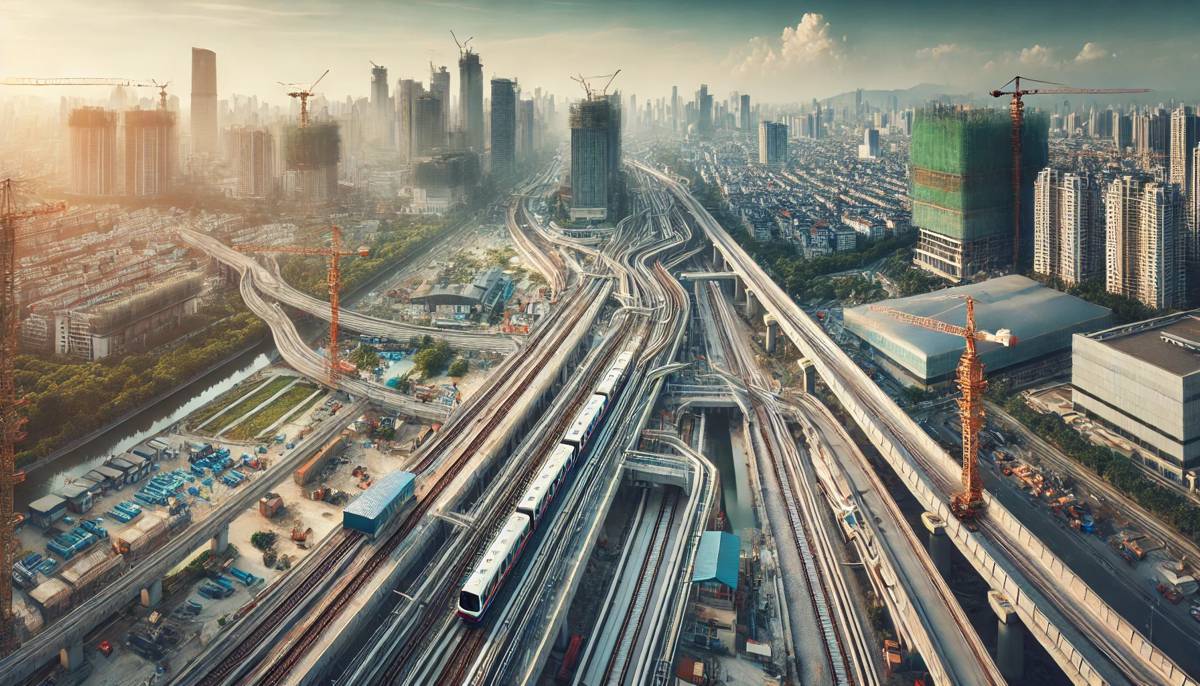Korail Selected to transform Metro Transit in the Philippines with MRT-7
South Korea’s state-owned railway giant, Korail, has been named the preferred bidder to oversee the operation and maintenance of the much-anticipated Manila Metro Line 7 (MRT-7) in the Philippines. This new partnership is not just another contract—it represents a vital step forward in Metro Manila’s urban transport development, offering a modern, efficient, and sustainable solution to the region’s growing mobility demands.
The MRT-7, spanning 23 kilometres, is set to transform the way passengers move between Quezon City and Bulacan, two crucial areas in Metro Manila. Scheduled to launch operations in November 2025, the new line is projected to slash travel times significantly. Currently, commuters spend over two hours travelling between San Jose del Monte and Quezon City, but once the line is fully operational, this will shrink to a swift 34 minutes.
Furthermore, the line is expected to serve between 300,000 to 850,000 passengers daily, which will drastically ease the pressure on Metro Manila’s notoriously congested roads. With a total of 14 stations along the route, the MRT-7 will offer a reliable, modern alternative to the city’s existing transportation systems.
Korail’s Long-standing Relationship with the Philippines
This isn’t Korail’s first foray into the Philippines. Their partnership with the country began back in 2012, when they were involved in the improvement of Manila Light Rail Transit Line 1 (LRT-1). This earlier project laid the groundwork for Korail’s expertise in the local railway sector, and over time, the South Korean company has become a trusted name in the Philippines’ transportation landscape.
Since 2016, Korail has been closely collaborating with San Miguel Corporation (SMC), the Philippine conglomerate leading the MRT-7 project. As the first private company in the Philippines to acquire business rights for a major railway project, SMC brings business acumen and local insight, while Korail adds decades of international railway experience. This winning combination is set to redefine urban transit in Metro Manila.
Korail’s role hasn’t just been about technical assistance either. They’ve been working tirelessly behind the scenes, consulting on the overall design, system verification, and commissioning of the MRT-7. Korail’s responsibilities include ensuring all components, from vehicles to control systems, meet international standards. Their involvement also extends to training the local workforce, particularly engineers and controllers, ensuring the smooth and safe operation of the line once it becomes operational.
A Vital Collaboration for the Future of Philippine Railways
The partnership between Korail and San Miguel represents a significant shift for the Philippines, where private sector participation in large-scale infrastructure projects has traditionally been limited. By collaborating with international giants like Korail, the Philippines is not only improving its infrastructure but also laying the foundation for future public-private partnerships (PPPs) in various sectors.
This project marks a pivotal moment for the Philippine government, which has been focused on modernising its transportation systems through its Build, Build, Build initiative. As the country’s population continues to rise, the demand for efficient public transport is greater than ever, and MRT-7 is a major component in addressing this need.
With a commitment to modernise Metro Manila’s public transport, MRT-7 is expected to play a key role in reducing traffic congestion, minimising air pollution, and improving the overall quality of life for millions of commuters. The railway will also stimulate economic growth by making it easier for people to access jobs, education, and services.
Korail’s Technological Edge and Global Expertise
Korail’s involvement in MRT-7 brings a level of expertise honed from decades of managing South Korea’s world-renowned KTX high-speed trains and intricate urban railway networks. Their operational efficiency and technical innovation are widely regarded in the international community, with Korea boasting some of the most advanced rail systems globally.
The South Korean company has established a solid reputation for implementing state-of-the-art technology in railway operations, including automation, advanced safety protocols, and customer-focused services. These competencies will be pivotal in ensuring that MRT-7 operates seamlessly from day one.
Additionally, Korail’s technical prowess isn’t limited to operating trains. Their comprehensive approach includes system verification—essentially ensuring that all systems, from track alignment to signalling, work in harmony to guarantee a safe, reliable service. They’ve also played a crucial role in the commissioning phase, a final testing period before a system is fully launched to the public.
Key Milestones for the MRT-7
As the project moves forward, both Korail and San Miguel have ambitious goals to meet. The final operation and maintenance contract is expected to be signed in 2024, giving Korail ample time to fine-tune the final details before the November 2025 launch.
Key priorities for the coming months include:
- Finalising the contractual terms between Korail and San Miguel
- Completing the remaining construction and testing of MRT-7 infrastructure
- Training and certifying local personnel for critical operational roles
- Conducting rigorous safety and performance testing before the public launch
These tasks are not to be underestimated, but given Korail’s track record and San Miguel’s business acumen, industry insiders are confident that the MRT-7 will be a resounding success.
The Road to a Smarter, More Sustainable Metro Manila
With Korail’s selection as the operator, the Philippines is poised to join the ranks of global cities with advanced, sustainable, and commuter-friendly public transport systems. The MRT-7 will be a game-changer not only for Metro Manila but for the country as a whole, offering a glimpse of a more interconnected and accessible future.
Korail’s role goes beyond simply operating a railway. By contributing to the training of local engineers, implementing international best practices, and providing cutting-edge technology, they’re helping to shape the future of the Philippines’ railway sector. In turn, this collaboration with San Miguel lays the foundation for long-term partnerships that could propel the country’s infrastructure into the future.
A Promising Future for the Philippines’ Rail Network
As the MRT-7 project approaches its final stages, it is clear that Korail’s involvement represents a leap forward in the modernisation of Philippine infrastructure. The enhanced mobility, reduced congestion, and improved quality of life that the MRT-7 promises will undoubtedly serve as a catalyst for future projects.
Korail’s work in the Philippines is not just a business deal—it’s a strategic collaboration designed to usher in a new era of railway transportation for the country. With cutting-edge technology, expert consultation, and an emphasis on local workforce development, the MRT-7 project is a shining example of how global expertise can bring about significant, positive change.






























